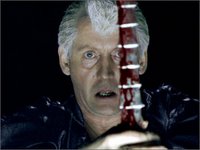Movie Review: Night Watch
 Night Watch (2004, "Nochnoy Dozor" in its original language) is a Russian horror thriller set in Moscow. In a review in New York Magazine earlier this year, David Edelstein said: "The director, Timur Bekmambetov, hails from music videos and commercials, and his tricks are all secondhand." That may be true, but I was positively dazzled in the first ten minutes.
Night Watch (2004, "Nochnoy Dozor" in its original language) is a Russian horror thriller set in Moscow. In a review in New York Magazine earlier this year, David Edelstein said: "The director, Timur Bekmambetov, hails from music videos and commercials, and his tricks are all secondhand." That may be true, but I was positively dazzled in the first ten minutes. This is a vampire thriller. The movie opens with a Lord of the Rings-esque battle scene after which the forces of light and dark make a truce and agree to send out a Day Watch (the dark forces) and a Night Watch (the light forces) to protect the peace. Cut to Moscow, 1992. The narrator tells us a man makes a decision that may affect the balance of power. Cut to 12 years later, when the bulk of the movie is set.
The first thing that stand out in this movie (besides the stellar special effects) is the refreshingly self-conscious use of the subtitles. I don't know if this is an artifact of the original film or if someone -- perhaps the director? -- decided to have fun with them. When a man screams "No!" a number of large Russian Constructivist-like "No" subtitles surround his face. Subtitles are often placed in the most noticeable parts of the screen, and not just the bottom. When a child gets a bloody nose in a swimming pool, a disembodied voice calls him, and the subtitles for that ghostly voice are rendered blood-red; the letters dissipate in smokey tendrils like the blood in the water.
And the movie begins its gradual descent downhill from there. There are moments, but ultimately Night Watch is as Edelstein said, derivavtive. It's Highlander with the sensibilities of Blade. The director's music video background serves him well in the effects department, and certainly with regard to cinematography and color, but fast-paced visual heritage doesn't serve him as well it did Spike Jonze with Being John Malkovich.
This movie reminds me of the French werewolf thriller Brotherhood of the Wolf (2001) in that the most remarkable thing it did for its niche of the horror genre is that it brought us a film that wasn't made from an American perspective.
However, Konstantin Khabensky was superb as the moody and reluctant hero, Anton. Whenever an "Other," as the supernatural vampire beings are called, finds out his or her true nature, they must make a choice: the dark or the light. Anton chooses the light, and he discovers his special power is clairvoyance, although all of his peers seem to turn into animals. Khabensky had a very watchable presence -- he managed to be violent without seeming malicious or calculating -- but the character needed more development. The film tried, though. Anton's best friend was his evil vampire neighbor across the hall. Too bad the two-hour movie didn't have time to show us more of that relationship.
 Night Watch really suffered for lack of truly creepy bad guys. What this film needed was an actor on the level of the supremely spooky Udo Kier, who played the Vampire Elder Dragonetti in Blade (1998). Viktor Verzhbitsky's Zavulon, the lead dark vampire in Night Watch, is satisfactory until the end, when his puffy white 80s-style vampire widow's peak hairdo provides a comical distraction from his menacing expression. Evil coiffures are tricky.
Night Watch really suffered for lack of truly creepy bad guys. What this film needed was an actor on the level of the supremely spooky Udo Kier, who played the Vampire Elder Dragonetti in Blade (1998). Viktor Verzhbitsky's Zavulon, the lead dark vampire in Night Watch, is satisfactory until the end, when his puffy white 80s-style vampire widow's peak hairdo provides a comical distraction from his menacing expression. Evil coiffures are tricky. Still it's supposed to be part of a trilogy -- this installment ends on a cliffhanger -- and I'm looking forward to the next one, Дневной Дозор (Day Watch), which is already done and the third, Dusk Watch, is in production.


0 Comments:
Post a Comment
<< Home